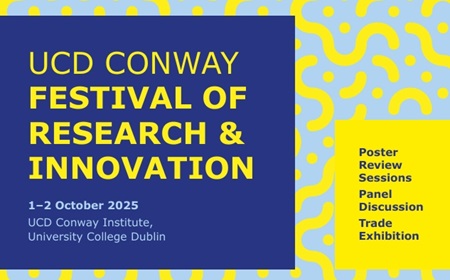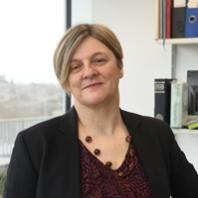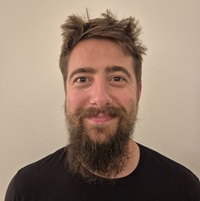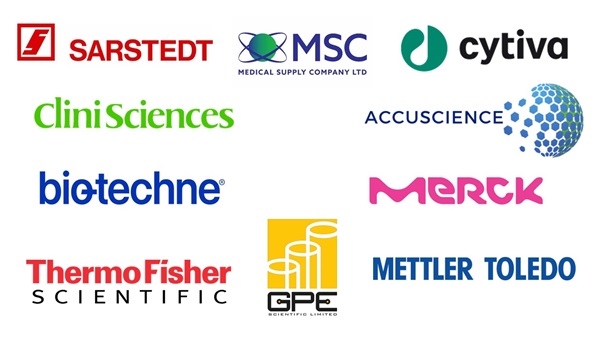2025 UCD Conway Festival of Research & Innovation
Celebrating research and innovation outputs from across the Institute in areas of Personalised & Translational Medicine; Discovery Research & One Health.
Join us for a programme of plenary and invited guest speakers, oral and poster presentations from early career researchers, a panel discussion and trade exhibition.
Register via: bit.ly/Conwayfest25

Show/hide content Open Close All
'Gene regulation from the dark genome'
Vertebrate complexity comes not from the number of genes in the genome but from the 100s of thousands of genetic switches - enhancers - that regulate gene expression in time and space. Enhancers are located across vast swathes of the non-coding genome making it challenging to identify them, the genes they regulate, and how they communicate to their target genes - often over long genomic distances. I will describe our work that is trying to tackle this major knowledge gap.
 Biography: Wendy Bickmore is Director of the MRC Human Genetics Unit at the University of Edinburgh. Her undergraduate degree is in Biochemistry from the University of Oxford, and she then completed a PhD in molecular biology at the University of Edinburgh. Following a postdoctoral fellowship in human genetics, Wendy started her independent research group as a fellow of the Lister Institute for Preventive Medicine. She is fascinated by the 3D organisation of the human genome in cells and how that influences genome function in health and disease. Her current research explores how the non-coding genome regulates gene expression including how distant enhancers communicate with their target gene promoters. Wendy is a Fellow of: the Royal Society, the Royal Society of Edinburgh and of the Academy of Medical Sciences and is a member of the European Molecular Biology Organisation and an international member of the National Academy of Sciences. She was awarded a CBE for services to science and to women in science.
Biography: Wendy Bickmore is Director of the MRC Human Genetics Unit at the University of Edinburgh. Her undergraduate degree is in Biochemistry from the University of Oxford, and she then completed a PhD in molecular biology at the University of Edinburgh. Following a postdoctoral fellowship in human genetics, Wendy started her independent research group as a fellow of the Lister Institute for Preventive Medicine. She is fascinated by the 3D organisation of the human genome in cells and how that influences genome function in health and disease. Her current research explores how the non-coding genome regulates gene expression including how distant enhancers communicate with their target gene promoters. Wendy is a Fellow of: the Royal Society, the Royal Society of Edinburgh and of the Academy of Medical Sciences and is a member of the European Molecular Biology Organisation and an international member of the National Academy of Sciences. She was awarded a CBE for services to science and to women in science.
'How brain drainage ensures its health'
Brain homeostasis depends on efficient clearance of metabolic waste and immune signals. We identified functional lymphatic vessels within the meninges that drain cerebrospinal and interstitial fluids to peripheral nodes. In mouse models, genetic or surgical ablation of these vessels impairs glymphatic flow, alters neuroimmune crosstalk, disrupts sleep architecture, and accelerates neurodegeneration. Enhancing meningeal lymphatic patency restores clearance and ameliorates pathology. These findings redefine central nervous system immune privilege and nominate brain drainage pathways as tractable therapeutic targets.
 Biography:
Biography:
Antoine Drieu is a tenured research group leader at Paris-Cité University in the Institute of Psychiatry and Neuroscience of Paris (IPNP). His research focuses on the interactions between the meninges and the central nervous system, aiming to understand the cellular and molecular mechanisms underlying neurodegenerative and psychiatric disorders. Dr Drieu did his PhD in the laboratory of Denis Vivien (Caen-Normandy University, France) and his postdoctoral fellowship in the laboratory of Jonathan Kipnis (WashU, USA).
'Tissue- and Cell-Responsive Biomaterials for Precision Medicine'
The traditional "one-size-fits-all" approach to biomaterial design overlooks the dynamic and tissue- and cell-specific variations in surface chemistry and biology. Our laboratory develops biomaterials that respond to specific cues from tissues and cells to enhance therapeutic efficacy and biocompatibility.
In designing biomaterials across multiple length scales to overcome physiological barriers to the precise spatiotemporal delivery of immunotherapies, we enable synergistic combinations with existing and emerging therapeutic modalities. This transforms treatment paradigms for cancer, autoimmune disorders, and vascular diseases.
 Biography:
Biography:
Natalie Artzi is a biomedical scientist and engineer whose work in structural nanomedicine is reshaping therapeutic and diagnostic strategies. Her research centers on engineering nanostructures with precise molecular and cellular architectures, enabling targeted, responsive, and effective treatment delivery. Natalie is a Hansjӧrg Wyss Associate Professor of Biologically Inspired Engineering at Harvard Medical School, Head of Structural Nanomedicine at Mass General Brigham's Gene and Cell Therapy Institute, and Associate Institute Director of the Wyss Institute for Biologically Inspired Engineering at Harvard University. Natalie has earned numerous honors, including the 2025 Dr. Alexander M. Cruickshank (AMC) Lecturer at the Gordon Research Conference on Cancer Nanotechnology, 2024 Rosemary Schnell Distinguished Lecture Award from the International Institute for Nanotechnology, 2024 Acta Biomaterialia Silver Medal, the 2024 Clemson Award for Applied Research, and the Society for Biomaterials Mid-Career Award.
Prof. Ronan Cahill
UCD School of Medicine & Mater Misericordiae University Hospital
'AI and Cancer Surgery'
Dr Gary Brennan
UCD School Biomolecular & Biomedical Science & Fellow, UCD Conway
‘Making its Mark: How m6A Shapes the Epileptic Brain’
Assoc. Prof. Rory Johnson
UCD School of Biology & Environmental Science & Fellow, UCD Conway Institute
‘How mutations remodel RNA regulatory networks in cancer cells, as revealed by 13,000 tumours’
Prof. Grainne O’Kane
UCD School of Medicine, SVUH & Fellow, UCD Conway Institute
‘Pancreatic cancer: the multiple faces of an aggressive disease’
Facilitator: Assoc. Prof. Niamh O'Sullivan, UCD School of Biomolecular & Biomedical Science & Fellow, UCD Conway
Topic: Positioning for success in an evolving research funding landscape
Panel:
Dr Martha Cahill, National Contact Point for Cluster 1 Health
Enterprise Ireland
Martha is the National Contact Point (NCP) for Cluster 1 - Health, NCP for the Cancer Mission as well as State Representative for Innovative Health Initiative (IHI). Working as a Senior Scientific Officer with Enterprise Ireland, she has more than 20 years’ experience in the biomedical research, software and technology industries with technical and commercial expertise.
Prof. Breandan Kennedy, UCD
With research interests focused on developing genetic and pharmacological treatments for human blindness, Prof. Kennedy has secured European funding as co-ordinator of three large scale industry-academia consortia; IAPP 3D-NET, H2020 RISE 3D-NeoNET and H2020 RISE CRYSTAL3.
Dr Carlos Matellan, UCD
A funded early career researcher, Dr Matellan awarded the 2023 IRC Thomas Mitchell Medal of Excellence for being the top-ranked postdoctoral researcher in the science, technology, engineering and mathematics category.
| Time | Location | Session Details |
|---|---|---|
| 10am | Conway Lecture Theatre | WELCOME & OPENING ADDRESS Prof. Helen Roche, Director |
| 10.05am | Conway Lecture Theatre | INVITED LECTURES Chair: Dr Clare Reynolds, Conway Fellow, UCD School of Public Health, Physiotherapy & Sports Science Prof. Ronan Cahill
UCD School of Medicine & Mater Misericordiae University Hospital ‘AI and Cancer Surgery’ Dr Gary Brennan UCD School Biomolecular & Biomedical Science & Fellow, UCD Conway ‘Making its Mark: How m6A Shapes the Epileptic Brain’ |
| 11am | Conway Foyer | Refreshments & Trade Exhibition |
| 11.30am | Conway Lecture Theatre |
PLENARY LECTURE 1
Chair: Dr Eric Conway, UCD School of Biomolecular & Biomedical Science Prof. Wendy Bickmore
Director, MRC Human Genetics Unit, University of Edinburgh 'Gene regulation from the dark genome' |
| 12.30pm | Conway Foyer | Lunch |
| 2pm | Conway / Charles |
POSTER REVIEW SESSIONS |
| 3pm | Conway Lecture Theatre |
INVITED LECTURES
Chair: Dr Claire Robinson, Conway Fellow, UCD School of Medicine Assoc. Prof. Rory Johnson Prof. Grainne O’Kane |
| 4pm | Conway Lecture Theatre |
PANEL DISCUSSION Facilitator: Dr Niamh O'Sullivan, UCD School of Biomolecular & Biomedical Science & Fellow, UCD Conway Topic: Positioning for success in an evolving research funding landscape Panel: Dr Martha Cahill, National Contact Point for Cluster 1 Health Prof. Breandan Kennedy, UCD Dr Carlos Matellan, UCD |
| 5pm | Close Day 1 |
| Time | Location | Session Details |
|---|---|---|
| 10am | Conway Lecture Theatre | PLENARY LECTURE 2 Chair: Dr Jeffrey Glennon, Conway Fellow, UCD School of Medicine Dr Antoine Drieu Institute of Psychiatry and Neuroscience of Paris, Paris-Cité University 'How brain drainage ensures its health' |
| 11am | Conway Foyer | Refreshments & Trade Exhibition |
| 11.30am | Conway /Charles |
POSTER REVIEW SESSION II |
| 12.30pm | Conway Foyer | Lunch & Trade Exhibition |
| 2pm | Conway Lecture Theatre |
FESTIVAL GOLD MEDAL COMPETITION Dr Tess McCann [Kennedy group] |
| 3.15pm | Conway Foyer | Refreshments |
| 3.45pm | Conway Lecture Theatre | PLENARY LECTURE 3 Chair: Assoc. Prof. Fiona Freeman (TBC), Conway Fellow, UCD School of Mechanical and Materials Engineering Prof. Natalie Artzi Harvard Medical School; Institute for Medical Engineering and Science at MIT; Wyss Institute for Biologically Inspired Engineering 'Tissue- and Cell-Responsive Biomaterials for Precision Medicine' |
| 5pm | Conway Foyer |
AWARDS CEREMONY |
The 2025 UCD Conway Festival abstract call is now closed for (a) poster review and (b) Conway Gold Medal competitions.
The Festival committee would like to thank all authors for their submissions.
2025 UCD Conway Festival Poster Revew Session: Authors by Alphabetical Listing
The following authors have been shortlisted for the 2025 Conway Festival Gold Medal competition sponsored by Cruinn Diagnostics.
Dr Tess McCann [Kennedy group]
Emc1 is essential for vision and zebrafish photoreceptor outer segment morphogenesis.
Emmanuelle D. Aiyegbusi [Dooley group]
Forced polarisation of microglia by IL-13 is modified by inflammatory and microenvironmental context
Dr Maurice O Mara [Knaus group]
Spatiotemporal H2O2 flashes coordinate actin cytoskeletal remodeling and regulate cell migration and wound healing.
Angelique Cheryl [McGee group]
Identification of bone marrow and peripheral blood plasma extracellular vesicle protein biomarker signatures for multiple myeloma diagnosis and staging.
Dr Luke Jones [Bond group]
A structure-based modelling approach identifies effective drug combinations for RAS-mutant acute myeloid leukemia.
UCD Conway Institute is grateful for the support of the following companies to enable the running of this event:
Platinum Sponsor
.jpg)
Gold Sponsors

Social Media Links